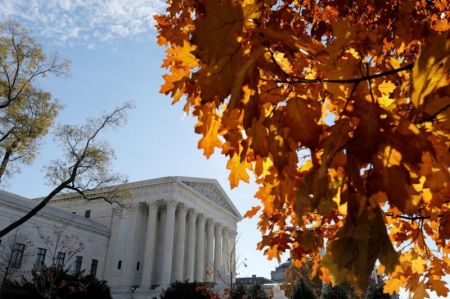Supreme Court vacates decision against religious groups fighting NY abortion coverage mandate

The U.S. Supreme Court has vacated a lower court ruling against multiple religious employers seeking an exemption to a 2017 New York regulation requiring employers to provide healthcare plans that include coverage of medically necessary abortions.
In an order released Monday morning, the nation’s high court vacated a lower court ruling in the case of Roman Catholic Diocese of Albany, et al. v. Emani, Shiri, et al., remanding the case back to the New York Court of Appeals.
The Supreme Court cited its unanimous July decision in Fulton v. City of Philadelphia to justify the order. In that case, the high court ruled that Philadelphia officials could not exclude a Catholic charity from its foster program because the organization refused to place children with same-sex couples for religious reasons.
Conservative Justices Clarence Thomas, Samuel Alito and Neil Gorsuch voted to hear the charities’ appeal rather than send the case back to the lower courts.
Eric Baxter, vice president and senior counsel at Becket, a legal nonprofit that represents the diocese, said in a statement that he is “thankful” for the order.
“New York clearly learned nothing from the federal government’s own attempts to force nuns to pay for contraceptives and is now needlessly threatening charities because they believe in the dignity and humanity of every human person,” stated Baxter.
“We are thankful that the Supreme Court won’t allow the New York Court of Appeals’ bad ruling to be the last word on the right of religious ministries to serve New Yorkers of all faiths.”
A group of religious organizations and orders, including multiple Roman Catholic dioceses, Catholic Charities, an Anglican order of nuns and multiple Protestant churches filed lawsuits against New York over its abortion coverage mandate.
“We believe that every person is made in the image of God,” said Mother Miriam of the Sisterhood of Saint Mary, the oldest Anglican religious order founded in America. “That’s why we believe in the sanctity of human life, and why we seek to serve those of all faiths — or no faith at all — in our community. We’re grateful that the Supreme Court has taken action in our case and hopeful that, this time around, the New York Court of Appeals will preserve our ability to serve and encourage our neighbors.”
The New York Codes, Rules and Regulations, Title 11, Section 52.16 (o) prohibits healthcare policies from limiting what it describes as “medically necessary” abortions.
“No policy delivered or issued for delivery in this State that provides hospital, surgical, or medical expense coverage shall limit or exclude coverage for abortions that are medically necessary,” the section reads.
“Coverage for in-network abortions that are medically necessary shall not be subject to copayments, or coinsurance, or annual deductibles, unless the policy is a high deductible health plan … in which case coverage for medically necessary abortions may be subject to the plan’s annual deductible.”
The New York mandate allows for a religious exemption, provided that the insurer for the religious employer “obtains an annual certification” confirming their status and that the insurer issues “a rider for coverage of medically necessary abortions.”
In section 52.2 of the New York Codes, a “religious employer” is defined as an entity that engages in the “inculcation of religious values,” “primarily employs persons who share the religious tenets of the entity,” “serves primarily persons who share the religious tenets of the entity” and “is a nonprofit organization.”
The plaintiffs contend that New York holds too narrow of a definition on what constitutes a religious employer and unlawfully restricts who can receive an exemption.
“But religious organizations that have a broader purpose, such as serving the poor, or that employ or serve members of other faiths or no faith, must cover abortions in their health plans,” stated the plaintiffs’ petition to the Supreme Court filed in April.
The U.S. Supreme Court has previously ruled in favor of Christian-owned businesses and religious groups that sued for an exemption to an Obamacare mandate that required employers to provide health plans that cover birth control.





















